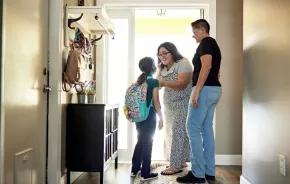They are only preschoolers, but they are on a dangerous mission. They must find the witch who holds the key to the secret potion that will save their friend Shadow. She is nearby -- but where?
At last, they see her sitting in her glass-enclosed lair, wrapped in a colorful shawl. They get the potion and Shadow is saved. But not before she threatens to turn all girls named Katie into ladybugs, and Sadie into a crab.
It's just another day in the life of the children in C.A.S.T. (Creative Arts for Small Thespians), a class designed by Seattle Children's Theatre for preschoolers.
Theater classes for preschoolers? They must be aimed at stage moms and dads who want their tots to have a head start on the way to stage and screen. Well, not exactly. Parents who enroll their children in these classes have many goals, but creating the next child star usually is not among them.
"It's not about that," says David Evans of Issaquah, whose 4-year-old son Sam attends Village Theatre's Pint-Sized Players, a preschool class in Issaquah that also offers classes in Everett. "It's more about having fun, taking in as much as he can. I'm hoping it will build his self-confidence."
Aruna Reeves of Issaquah has similar goals for her 5-year-old son Jasen, another student in Pint-Sized Players. "My son has a shy personality," she says. "I was looking for some place where he could express himself."
"What we're finding is that the earlier we start [children in] theater, the more confident they are as they develop. They learn to trust their own inner artist, their own voice. It becomes part of their everyday experience," says Kati Nickerson, Village Theatre director of youth education. Nickerson, whose background is in co-op preschool, says her own daughter blossomed in theater classes, leaving her shyness behind and developing skills that served her through college.
The fast-paced Everett class is taught by Erica Weir, whose background is in music and early education. Here, the dozen 4- and 5-year-olds are in constant motion. They wiggle across the floor as caterpillars; they soar as butterflies; they cower before the stern captain of a pirate ship: "Aargh, Matey!"
The only quiet time is during the reading of the Eric Carle book that they will act out later. "We concentrate on moving our bodies, using our voices," Weir says. "Some kids come in with the expectation to perform. I've had 4-year-olds who didn't understand why they weren't on the big stage. I tell them they wouldn't really like it if they were."
Kari Hicks of Everett says her 5-year-old daughter Greta loves to perform. "But, at this age, this is more about giving her experiences to allow her to be creative through acting and singing."
Although performance is not the emphasis of preschool classes, children are introduced to professional theater by attending productions of Storybook Theater, says Laura Shepherd, program coordinator for Studio East in Kirkland. After the performance, they invent and act out their own characters and stories.
"They have an opportunity to see a professional performance and go back to class and do the same thing," she says.
At the Seattle Children's Theatre, the C.A.S.T. program offers two-and-a-half-hour sessions twice a week. Here, children get the benefit of all the skills available through the theatre staff.
Jill DeGreen of Magnolia chose the program for 5-year-old Isabel instead of kindergarten. "She's been in a more traditional preschool for the last two years," DeGreen says. "My hope was that it would spark her imagination and creative play."
Instructor Meredith Berlin explains that imagination and creativity are the hallmarks of her class, but there is much more. "Some things we do because they are fun, but everything is done through the lens of what we do as artists here at the Children's Theatre," Berlin says. "Here we have the skills needed in life -- science, math, social skills, problem-solving."
Last year children did a public service project to buy cat food for a local animal shelter. They met with the development office and heard about what they did to raise money, then developed a plan of their own (selling singing telegrams for a dollar each.) They created the telegrams, made posters to market them, sold them and wrote thank-you notes after the event.
Preschoolers also have the opportunity to attend rehearsals and explore sets created for SCT productions.
Back in the classroom, the surroundings are sparse. "If you look around, you don't see a lot of stuff," Berlin says. "We use props, but they are used to enhance the way we use our voices and bodies and our imagination."
Amanda Williams, education director at Youth Theatre Northwest, agrees. "The goal is to let them be free to explore their friendships and themselves, letting them be free to be who they are and have fun figuring that out," she says.
Students in one of Williams' classes create and act out a continuing story, which lasts all semester. One class is now trying to restore magic powers to a witch who, sadly, was thrown out of her town because her powers were mysteriously lost.
"I try to sneak in a secret message about how it feels to be left out," Williams says. The children travel to this magic land every day by going through a hula hoop. They fall through the hole and -- powered by their imaginations -- find themselves in a different world.
Imagination is also the key to a game called "This is Not" played by the class at the Village Theatre in Issaquah. "This is not a cup," intones instructor Kate Swenson, holding up a cup. "This is a nose," she announces, hanging it on her nose to the giggles of her students.
Now it's their turn. The cup, (which is not a cup) becomes a bucket, a mouse, a shoe, anything but a cup.
"This is more creative play rather than being performance oriented," says Swenson, an actress for whom this is her "day job." Swenson says she finds it gratifying to see a shy child blossom in her class. And, she finds that she benefits as well.
"They keep it fresh for me," she says. "They remind me how cool it is just to dance around with pretty scarves."
Elaine Bowers, a freelance writer, lives in Seattle with her husband and 14-year-old twin daughters.
What should you look for in a drama class?
- Look first for a class that can ignite your child's imagination through a variety of activities -- movement, storytelling, imaginative play. Don't expect the class to be performance-based.
- Be sure the instructor has the experience and energy to participate in activities with the students. Some instructors have acting experience; others have a background in early education. At least one teacher has another life as a professional clown. The key is how they interact with their students.
- Think about the experience you want for your child. Some classes are geared to a preschool curriculum. They are scheduled two or three times a week and last two to three hours. Others may be an hour long, once a week, and serve as an enhancement for your child's preschool. Classes of 12 or fewer students are best.
- Don't worry that your child has to be a natural performer to benefit from the class. Many parents choose drama classes to help their children overcome shyness.











